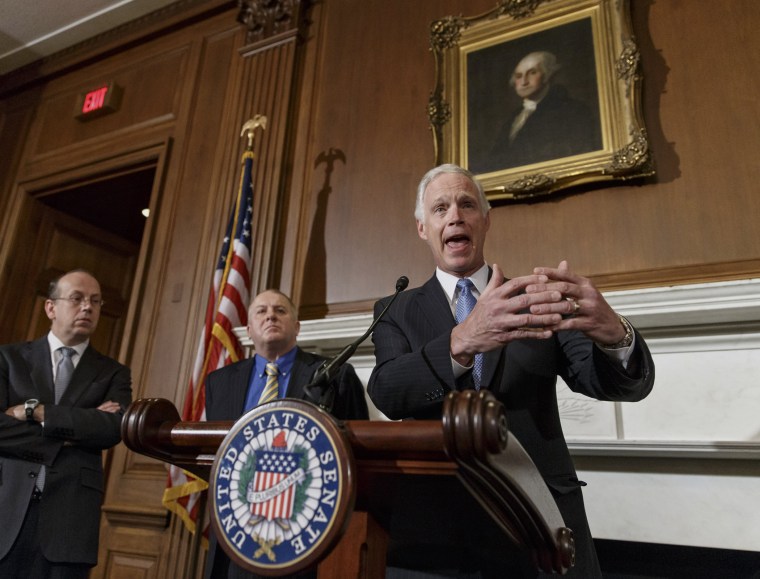In January 2014, Sen. Ron Johnson (R-Wis.) was so eager to demonstrate his opposition to the Affordable Care Act that he filed a deeply strange lawsuit against "Obamacare": he wanted to make coverage more expensive for people who work on Capitol Hill. Rep. Jim Sensenbrenner, a Republican from Johnson's home state of Wisconsin, said at the time that the senator's lawsuit was "frivolous" and an "unfortunate political stunt."
In July 2014, a federal district judge threw Johnson's case out of court. This morning, as the Milwaukee Journal Sentinel reported, an appeals court also blew off the Republican senator's misguided case.
A federal appeals panel sided with a lower court Tuesday to throw out a lawsuit over Obamacare brought by U.S. Sen. Ron Johnson and one of his aides. Johnson's suit attempted to force members of Congress and their staffs to stop getting subsidies for their health insurance under the Affordable Care Act, which is widely known as Obamacare.
The 7th Circuit's decision, which was unanimous, is online here (pdf).
As we discussed last summer, the problem here has always been one of "standing": how would the Republican senator demonstrate that he's been harmed by the health care policy he doesn't like? When filing a lawsuit challenging the legality of a law, it's not enough for plaintiffs to say, "I don't like it." Johnson had to demonstrate that he'd been adversely affected by ACA benefits.
The far-right senator's lawyers rolled out a creative line -- coverage for congressional staff led to Johnson's "damaged political reputation," according to the suit -- which has now failed miserably.
And which, ironically, has damaged Johnson's political reputation.
In a statement, the GOP lawmaker who's never demonstrated much of an interest in lawmaking, complained that his case has struggled due to a "legal technicality."
He appears to be referring to the basic procedural details of the American justice system.
Let's also not forget that a year ago, Johnson not only had high hopes for his case, he also had the enthusiastic support of his Republican colleagues. As we talked about at the time, 38 GOP senators signed onto a legal brief, urging the courts to rule in Johnson's favor.
As these lawmakers saw it, they were fighting for the preservation of the republic. "The unlawful executive action at issue in this case is not an isolated incident," the brief said. "Rather, it is part of an ongoing campaign by the executive branch to rewrite the Affordable Care Act on a wholesale basis."
The courts must side with Johnson, the GOP lawmakers' brief added, because the administration's campaign "threatens to subvert the most basic precept of our system of government."
It was, to be sure, a dumb and over-dramatic argument. But more important, it also failed miserably.
As for the underlying policy issue, a little background is probably in order. Johnson argued that Democrats came up with a congressional subsidy in the ACA "once members realized how harmful Obamacare actually was." That was brazenly false.
In reality, the law includes a provision that says members of Congress and their staffs have to sign up for coverage through an exchange. This became tricky because the exchange marketplaces were designed primarily for the uninsured, but Republicans said they wanted this in the law, so it's in there.
But the story got a little more complicated when the Office of Personnel Management had to decide whether lawmakers and their staffs should also receive the same employer subsidy as everyone else, or whether everyone on Capitol Hill should face higher costs just because they work on Capitol Hill. OPM, with the blessing of the House Republican leadership, said lawmakers and aides can keep the same employer subsidy and play by the same rules as everyone else.
And that's why Johnson sued -- he wanted Capitol Hill employees to pay more for health care because it would make the right feel better. As of today, the argument is a bust.
